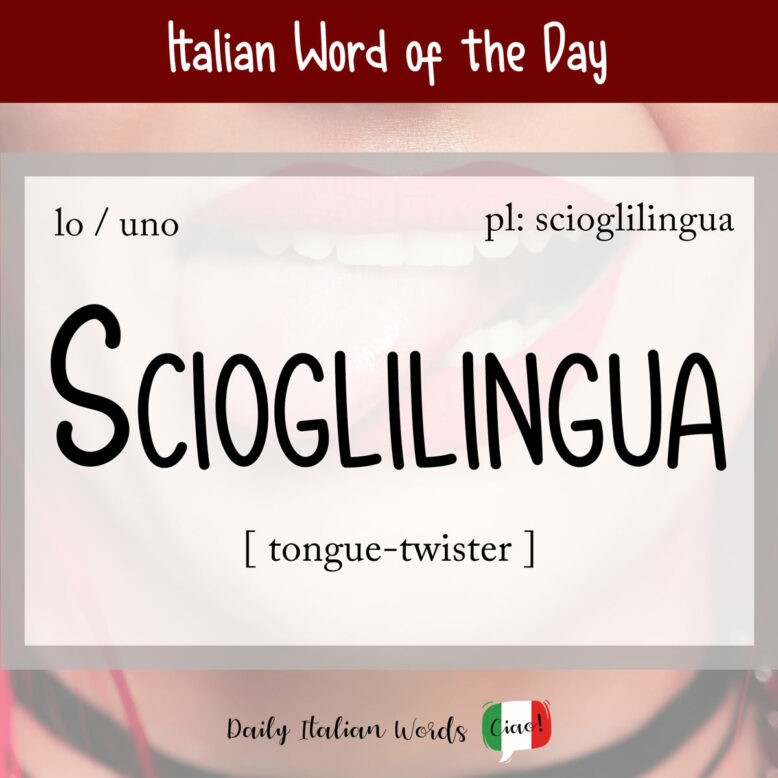Recently my son has taken a keen interest in tongue-twisters, especially those that his dear old mum has trouble saying. A tongue-twister in Italian is known as a scioglilingua, which is the combination of the verb sciogliere (to melt) and the noun lingua (tongue).
scioglilingua
tongue-twister

Scioglilingua is an invariable noun, so it’s form doesn’t change in the plural. (That being said, you may hear the plural scioglilingue in everyday spoken Italian.) It is also masculine, despite ending in the letter -a. Here are its definite and indefinite articles:
- lo scioglilingua = the tongue-twister
- uno scioglilingua = a tongue-twister
- gli scioglilingua = the tongue-twisters
- degli scioglilingua = some tongue-twisters
Scioglilingua are word games that are difficult to pronounce due to their use of alliteration, and must be recited quickly. They exist in all languages, even la lingua dei segni (sign language)!
According to Treccani, scioglilingua serve two main purposes: some are used as tongue exercises to overcome pronunciation difficulties, while others are designed to make people commit ridiculous pronunciation errors while reciting the rhyme. In the first case, they are called scioglilingua (or sveglialingua, with svegliare meaning “to wake up”) and in the second, they are known as farfalloni or bisticci. Many attori (actors), cantanti (singers), and conduttori (presenters) regularly recite scioglilingua to enhance their diction.
Did you know that…
In Spanish, a scioglilingua is known as a trabalenguas (“tongue-jammer”) while the German word Zungenbrecher literally translates to “tongue-breaker”?
Although there isn’t much more to say about the word itself, this article provides a great opportunity to explore some of the most famous scioglilingua in the Italian language. Can you say them without tripping up?

Trentatré trentini entrarono a Trento, tutti e trentatré trotterellando.
Thirty-three Trentino people entered Trento, all thirty-three trotting.
Li vuoi quei kiwi? E se non vuoi quei kiwi che kiwi vuoi?
Do you want those kiwis? And if you don’t want those kiwis, which kiwis do you want?
A quest’ora il questore in questura non c’è.
At this hour, the police chief is not at the police station.
Tito, tu m’hai ritinto il tetto, ma non t’intendi tanto di tetti ritinti.
Tito, you repainted my roof, but you don’t really know much about repainted roofs.
Una rana nera e rara sulla rena errò una sera.
A black and rare frog on the sand wandered one evening.
Sopra la panca la capra campa, sotto la panca la capra crepa.
On the bench, the goat lives; under the bench, the goat dies.
Apelle figlio d’Apollo fece una palla di pelle di pollo, tutti i pesci vennero a galla per vedere la palla di pelle di pollo fatta da Apelle figlio d’Apollo.
Apelles, the son of Apollo, made a ball out of chicken skin. All the fish came to the surface to see the chicken-skin ball made by Apelles, the son of Apollo.
Tre tigri contro tre tigri.
Three tigers against three tigers.
Heather Broster is a graduate with honours in linguistics from the University of Western Ontario. She is an aspiring polyglot, proficient in English and Italian, as well as Japanese, Welsh, and French to varying degrees of fluency. Originally from Toronto, Heather has resided in various countries, notably Italy for a period of six years. Her primary focus lies in the fields of language acquisition, education, and bilingual instruction.


